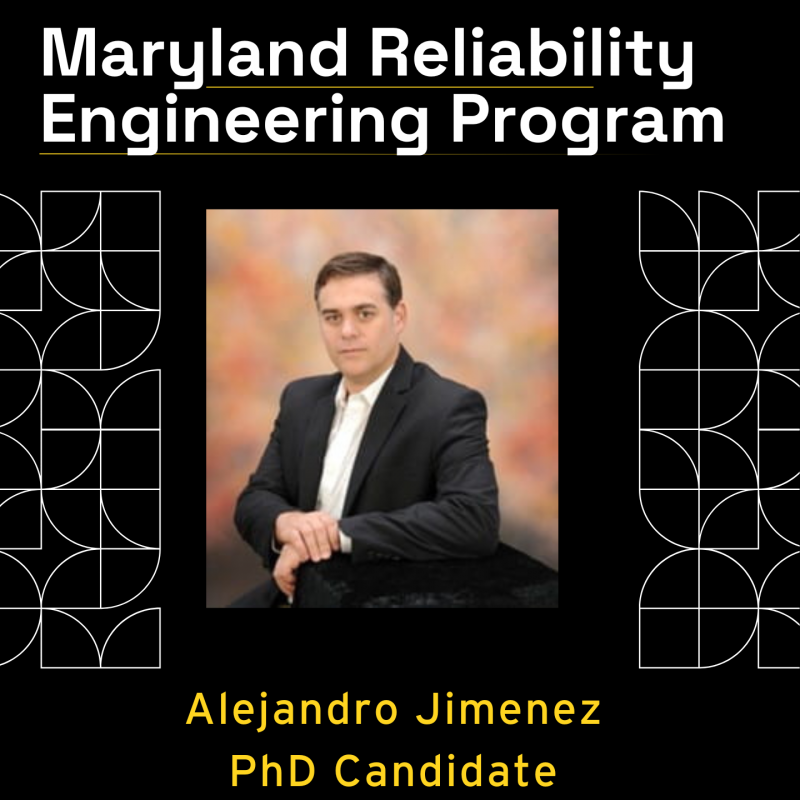
"Meet Alejandro a PhD candidate who used to be a firefighter"
Year in Program: 3
Advisor: Katrina Groth
Research interests: Risk Engineering, Process Safety, Reliability of Safety-Critical Systems and Devices, Failure Analysis, Fire and Explosion Investigation
Dissertation Topic (if applicable): Evaluating the risk trade-offs of pressure relief devices in hydrogen systems
What drew you to engineering?
Coming from a family full of engineers — including my mother, aunts, and uncles — engineering was always part of my environment. While it initially felt like a natural path to follow, I soon discovered my own passion for it. I was fascinated by how systems work — and even more so, by why they fail.
That curiosity deepened when I started volunteering with the fire department during my studies. Being on the front lines of emergency response made me see the critical role engineering plays in community safety. I witnessed firsthand how design decisions, system failures, and lack of preventive measures could lead to serious consequences. That experience shifted my perspective — engineering wasn’t just a technical field, it was a way to make a meaningful impact. It led me to focus on risk, reliability, and safety as a way to help prevent those emergencies from happening in the first place.
What made you choose UMD and the ENRE Reliability Program?
The University of Maryland has an outstanding reputation in the industry and offers the flexibility I needed to continue working full-time while pursuing my degree. The ENRE program strikes a unique balance between academic depth and real-world application, making it a perfect fit for my professional goals.
What do you want people to know about Reliability Engineering that they may not be aware of
For a society to move forward, it must learn from its past mistakes and evolve. As philosopher George Santayana famously said, "Those who cannot remember the past are condemned to repeat it." This concept lies at the heart of Reliability Engineering.
Reliability Engineering is more than just ensuring things don’t break — it’s about understanding why failures happen and using that knowledge to prevent them. It is the engine behind continuous improvement. In today’s complex and fast-paced world, organizations that want to thrive need reliability engineers. We help identify root causes of failure, guide design changes, and implement measures to prevent recurrence, ensuring safer, more resilient systems.
Fun fact about yourself?
Most people are surprised to learn I used to be a firefighter — and even more surprised to hear I now use that experience, along with my photography hobby, in my work as a forensic engineer. Funny how two seemingly unrelated paths — putting out fires and taking pictures — ended up complementing each other perfectly.
After living in Venezuela, the UK, Spain, and the U.S., I’ve learned that while people and problems may look different on the surface, deep down, we all tend to make the same kinds of mistakes. Now I get to investigate why things go wrong — and sometimes even capture the evidence through my lens.
Year in Program: 3
Advisor: Katrina Groth
Research interests: Risk Engineering, Process Safety, Reliability of Safety-Critical Systems and Devices, Failure Analysis, Fire and Explosion Investigation
Dissertation Topic (if applicable): Evaluating the risk trade-offs of pressure relief devices in hydrogen systems
What drew you to engineering?
Coming from a family full of engineers — including my mother, aunts, and uncles — engineering was always part of my environment. While it initially felt like a natural path to follow, I soon discovered my own passion for it. I was fascinated by how systems work — and even more so, by why they fail.
That curiosity deepened when I started volunteering with the fire department during my studies. Being on the front lines of emergency response made me see the critical role engineering plays in community safety. I witnessed firsthand how design decisions, system failures, and lack of preventive measures could lead to serious consequences. That experience shifted my perspective — engineering wasn’t just a technical field, it was a way to make a meaningful impact. It led me to focus on risk, reliability, and safety as a way to help prevent those emergencies from happening in the first place.
What made you choose UMD and the ENRE Reliability Program?
The University of Maryland has an outstanding reputation in the industry and offers the flexibility I needed to continue working full-time while pursuing my degree. The ENRE program strikes a unique balance between academic depth and real-world application, making it a perfect fit for my professional goals.
What do you want people to know about Reliability Engineering that they may not be aware of
For a society to move forward, it must learn from its past mistakes and evolve. As philosopher George Santayana famously said, "Those who cannot remember the past are condemned to repeat it." This concept lies at the heart of Reliability Engineering.
Reliability Engineering is more than just ensuring things don’t break — it’s about understanding why failures happen and using that knowledge to prevent them. It is the engine behind continuous improvement. In today’s complex and fast-paced world, organizations that want to thrive need reliability engineers. We help identify root causes of failure, guide design changes, and implement measures to prevent recurrence, ensuring safer, more resilient systems.
Fun fact about yourself?
Most people are surprised to learn I used to be a firefighter — and even more surprised to hear I now use that experience, along with my photography hobby, in my work as a forensic engineer. Funny how two seemingly unrelated paths — putting out fires and taking pictures — ended up complementing each other perfectly.
After living in Venezuela, the UK, Spain, and the U.S., I’ve learned that while people and problems may look different on the surface, deep down, we all tend to make the same kinds of mistakes. Now I get to investigate why things go wrong — and sometimes even capture the evidence through my lens.
Top